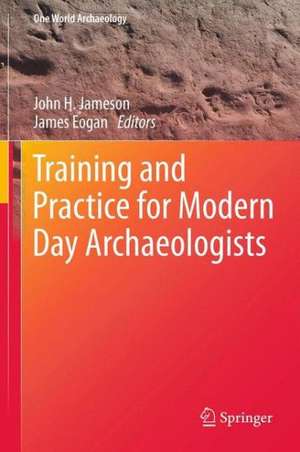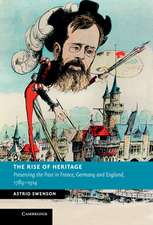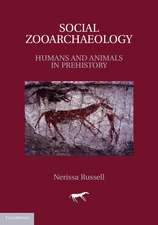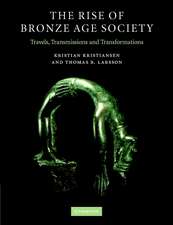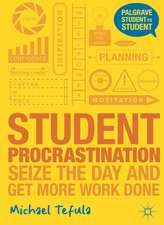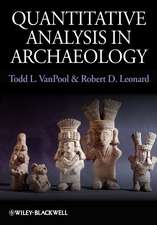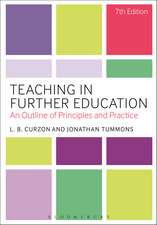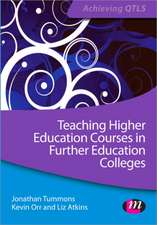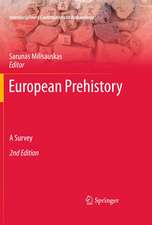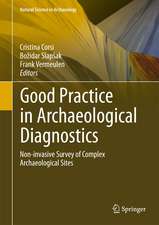Training and Practice for Modern Day Archaeologists: One World Archaeology
Editat de John H. Jameson, James Eoganen Limba Engleză Hardback – 7 dec 2012
But what is the collective experience of archaeologists and cultural heritage specialists in these arenas? Should we be encouraged, or discouraged, by national and international trends? In an attempt to answer these questions, this volume examines and gives representational examples of the respective approaches and roles of government, universities, and the private sector in meeting the educational/training needs and challenges of practicing archaeologists today.
| Toate formatele și edițiile | Preț | Express |
|---|---|---|
| Paperback (2) | 388.52 lei 6-8 săpt. | |
| Springer – 28 ian 2015 | 388.52 lei 6-8 săpt. | |
| Springer – 16 sep 2014 | 388.52 lei 6-8 săpt. | |
| Hardback (1) | 406.05 lei 6-8 săpt. | |
| Springer – 7 dec 2012 | 406.05 lei 6-8 săpt. |
Din seria One World Archaeology
-
 Preț: 417.17 lei
Preț: 417.17 lei - 8%
 Preț: 383.64 lei
Preț: 383.64 lei -
 Preț: 358.77 lei
Preț: 358.77 lei -
 Preț: 349.50 lei
Preț: 349.50 lei -
 Preț: 230.66 lei
Preț: 230.66 lei -
 Preț: 498.91 lei
Preț: 498.91 lei -
 Preț: 426.67 lei
Preț: 426.67 lei - 12%
 Preț: 336.21 lei
Preț: 336.21 lei -
 Preț: 389.38 lei
Preț: 389.38 lei - 25%
 Preț: 248.97 lei
Preț: 248.97 lei -
 Preț: 461.86 lei
Preț: 461.86 lei -
 Preț: 475.16 lei
Preț: 475.16 lei -
 Preț: 429.12 lei
Preț: 429.12 lei - 20%
 Preț: 114.19 lei
Preț: 114.19 lei - 18%
 Preț: 1061.81 lei
Preț: 1061.81 lei - 23%
 Preț: 329.50 lei
Preț: 329.50 lei - 18%
 Preț: 1345.33 lei
Preț: 1345.33 lei -
 Preț: 388.13 lei
Preț: 388.13 lei -
 Preț: 471.08 lei
Preț: 471.08 lei -
 Preț: 390.63 lei
Preț: 390.63 lei - 18%
 Preț: 1002.68 lei
Preț: 1002.68 lei -
 Preț: 511.20 lei
Preț: 511.20 lei -
 Preț: 472.21 lei
Preț: 472.21 lei - 18%
 Preț: 1010.22 lei
Preț: 1010.22 lei -
 Preț: 416.26 lei
Preț: 416.26 lei - 24%
 Preț: 331.04 lei
Preț: 331.04 lei -
 Preț: 494.48 lei
Preț: 494.48 lei -
 Preț: 402.17 lei
Preț: 402.17 lei - 18%
 Preț: 1062.16 lei
Preț: 1062.16 lei -
 Preț: 390.25 lei
Preț: 390.25 lei - 15%
 Preț: 470.69 lei
Preț: 470.69 lei -
 Preț: 476.08 lei
Preț: 476.08 lei - 25%
 Preț: 767.47 lei
Preț: 767.47 lei
Preț: 406.05 lei
Nou
Puncte Express: 609
Preț estimativ în valută:
77.69€ • 81.13$ • 64.16£
77.69€ • 81.13$ • 64.16£
Carte tipărită la comandă
Livrare economică 15-29 aprilie
Preluare comenzi: 021 569.72.76
Specificații
ISBN-13: 9781461455288
ISBN-10: 1461455286
Pagini: 304
Ilustrații: XXIV, 280 p.
Dimensiuni: 155 x 235 x 20 mm
Greutate: 0.84 kg
Ediția:2013
Editura: Springer
Colecția Springer
Seria One World Archaeology
Locul publicării:New York, NY, United States
ISBN-10: 1461455286
Pagini: 304
Ilustrații: XXIV, 280 p.
Dimensiuni: 155 x 235 x 20 mm
Greutate: 0.84 kg
Ediția:2013
Editura: Springer
Colecția Springer
Seria One World Archaeology
Locul publicării:New York, NY, United States
Public țintă
GraduateNotă biografică
John H. Jameson is Senior Archaeologist and Public Interpretation/Outreach Lead, Southeast Archaeological Center, National Park Service, U.S. Department of the Interior. He has long worked to improve the quality of programs and interdisciplinary training in the public interpretation of archaeological and cultural heritage. In 2005, he was awarded the Sequoia Award for long-term contributions to education and interpretation by the U.S. National Park Service. He serves as Vice President of the International Committee on Interpretation and Presentation of Cultural Heritage Sites (ICIP), International Committee on Monuments and Sites (ICOMOS).
James Eogan MA is a Senior Archaeologist at the National Roads Authority in Ireland. He is former Vice Chairman and is currently a member of the Board of Directors of the Institute of Archaeologists of Ireland.
James Eogan MA is a Senior Archaeologist at the National Roads Authority in Ireland. He is former Vice Chairman and is currently a member of the Board of Directors of the Institute of Archaeologists of Ireland.
Textul de pe ultima copertă
In recent years, an important and encouraging development has been the markedly increased number of collaborations among archaeologists, educators, preservation planners, and government managers, creating interdisciplinary approaches, methods, and solutions to archaeological heritage management. But what is the collective experience of archaeologists and cultural heritage specialists in these arenas? Should we be encouraged, or discouraged, by national and international trends? In order to answer these questions, Training and Practice for Modern Day Archaeologists explores a relatively new development in archaeology and historical preservation: new approaches to archeological and heritage education and training that accommodate globalization and the realities of the 21st century worldwide. The volume examines how the government, universities, and private sector meet, albeit not always, the educational and practical needs of practicing archaeologists today.
This volume gets to the heart of a number of relevant issues: the international mobility of archaeologists and heritage managers; the problems of sustaining employment in a volatile market; employment of archaeologists in managing the archaeological impact of development projects; training partnerships; and the generation and interpretation of archaeological data and knowledge that results from such projects. In the 21st century, it seems likely that an increasing proportion of archaeological survey, excavation, and conservation work will be undertaken to mitigate the impact of developments. To derive maximum benefits (academic, societal and professional) from this work, our archaeological practices need to evolve. The papers in this volume contribute to a greater understanding of the need for these new forms of practice. Thus, Training and Practice for Modern Day Archaeologists is an invaluable resource for archaeologists, heritage preservation specialists, resource managers, educators and trainers, site managers, and anybody interested in the conservation of world heritage.
This volume gets to the heart of a number of relevant issues: the international mobility of archaeologists and heritage managers; the problems of sustaining employment in a volatile market; employment of archaeologists in managing the archaeological impact of development projects; training partnerships; and the generation and interpretation of archaeological data and knowledge that results from such projects. In the 21st century, it seems likely that an increasing proportion of archaeological survey, excavation, and conservation work will be undertaken to mitigate the impact of developments. To derive maximum benefits (academic, societal and professional) from this work, our archaeological practices need to evolve. The papers in this volume contribute to a greater understanding of the need for these new forms of practice. Thus, Training and Practice for Modern Day Archaeologists is an invaluable resource for archaeologists, heritage preservation specialists, resource managers, educators and trainers, site managers, and anybody interested in the conservation of world heritage.
Caracteristici
Case study examples come from Western and Eastern Europe, the United States, Canada, former Soviet Republics, Africa, Asia, the Mediterranean, and Australia. Looks at the discrepancy between training and practice for modern-day archaeologists Explores how archaeologists function and integrate in the developing world Includes supplementary material: sn.pub/extras
